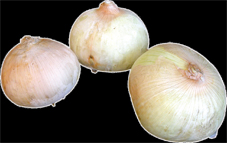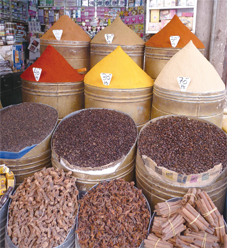Plant-based products - spices, aromatic and medicinal plants - with potential antioxidant activity are of increasing interest in order to replace the synthetic preservatives and reduce salt content
 SALT reduction is very much in the mind of food formulators worldwide, as the US Food and Drug Administration mulls over guidelines and targets on sodium levels, and on which kinds of food products. In a way, manufacturers of health-orientated foods have an edge - they've been advocating low-salt products all along. No single ingredient can substitute for salt when developing low- sodium alternatives. Minimal levels of salt means using a combination other flavour ingredients, and in natural and organic foods - including ready meals, snacks and soups - these are limited to clean label food additives. In addition to salt's flavour factor, new product developers need to consider sodium chloride抯 preservative effect. Reducing salt levels may often mean finding ingredients that provide antimicrobial properties on top of enhancing taste and mouthfeel. Spices and herbs not only add to the full-bodied flavour, but a number of them have antioxidants that also act as natural preservatives. The antioxidants are, moreover, linked to health- giving properties, such as flavonoids in yellow onions. Bulbs beat bacteria Some components of the onion have antioxidant and antimicrobial properties, making it possible to use this bulb for food preservation, say researchers from the Polytechnic University of Catalu馻 (UPC) and the University of Barcelona (UB). "The antioxidant and antimicrobial properties of the flavonoids of the raw onion make it a good candidate for use in food preservation," confirms Jonathan Santas, a researcher from the Department of Nutrition and Bromatology at UB and co-author of a project carried out in the Department of Agrifood Engineering and Biotechnology at UPC. Onion (Allium cepa) are one of the most cultivated and consumed vegetables on the planet (around 66 million tonnes in 2008, of which 1.1 million were produced in Spain, especially in Castilla- La Mancha), and one of the main ingredients of the Mediterranean diet. Researchers demonstrated that phenolic compounds in the onion prevent the development of bacteria such as Bacillus cereus, Staphylococcus aureus, Micrococcus luteus and Listeria monocytogenes, which are micro-organisms typically associated with the deterioration of foods The study, that has just been published by the International Journal of Food Science and Technology, shows that the flavonoids of onion, in addition to having beneficial properties for health, increase the life of foods, and so "they are a natural alternative to artificial additives used in the food industry. The results confirm that, especially the yellow variety, is "a good source of these types of substances, and there is a positive correlation between the presence of flavonoids and their antioxidant capacity." "The onion can be effective for delaying lipid oxidation in emulsions of oil and water - a model system of foods like margarines and mayonnaises - and it also inhibits the growth of microorganisms that alter foods," Santas explains. Previous studies indicate that flavonoids have beneficial effects for health due to their antioxidant, anti-inflammatory, cardioprotective, vasodilatory and anti-carcinogenic properties, making it of special interest in the prevention of chronic illnesses, such as cardiovascular illnesses, and some types of cancer.
SALT reduction is very much in the mind of food formulators worldwide, as the US Food and Drug Administration mulls over guidelines and targets on sodium levels, and on which kinds of food products. In a way, manufacturers of health-orientated foods have an edge - they've been advocating low-salt products all along. No single ingredient can substitute for salt when developing low- sodium alternatives. Minimal levels of salt means using a combination other flavour ingredients, and in natural and organic foods - including ready meals, snacks and soups - these are limited to clean label food additives. In addition to salt's flavour factor, new product developers need to consider sodium chloride抯 preservative effect. Reducing salt levels may often mean finding ingredients that provide antimicrobial properties on top of enhancing taste and mouthfeel. Spices and herbs not only add to the full-bodied flavour, but a number of them have antioxidants that also act as natural preservatives. The antioxidants are, moreover, linked to health- giving properties, such as flavonoids in yellow onions. Bulbs beat bacteria Some components of the onion have antioxidant and antimicrobial properties, making it possible to use this bulb for food preservation, say researchers from the Polytechnic University of Catalu馻 (UPC) and the University of Barcelona (UB). "The antioxidant and antimicrobial properties of the flavonoids of the raw onion make it a good candidate for use in food preservation," confirms Jonathan Santas, a researcher from the Department of Nutrition and Bromatology at UB and co-author of a project carried out in the Department of Agrifood Engineering and Biotechnology at UPC. Onion (Allium cepa) are one of the most cultivated and consumed vegetables on the planet (around 66 million tonnes in 2008, of which 1.1 million were produced in Spain, especially in Castilla- La Mancha), and one of the main ingredients of the Mediterranean diet. Researchers demonstrated that phenolic compounds in the onion prevent the development of bacteria such as Bacillus cereus, Staphylococcus aureus, Micrococcus luteus and Listeria monocytogenes, which are micro-organisms typically associated with the deterioration of foods The study, that has just been published by the International Journal of Food Science and Technology, shows that the flavonoids of onion, in addition to having beneficial properties for health, increase the life of foods, and so "they are a natural alternative to artificial additives used in the food industry. The results confirm that, especially the yellow variety, is "a good source of these types of substances, and there is a positive correlation between the presence of flavonoids and their antioxidant capacity." "The onion can be effective for delaying lipid oxidation in emulsions of oil and water - a model system of foods like margarines and mayonnaises - and it also inhibits the growth of microorganisms that alter foods," Santas explains. Previous studies indicate that flavonoids have beneficial effects for health due to their antioxidant, anti-inflammatory, cardioprotective, vasodilatory and anti-carcinogenic properties, making it of special interest in the prevention of chronic illnesses, such as cardiovascular illnesses, and some types of cancer.  The flavonoids of the onion are more stable than some of its other components, such as sulphur compounds. Traditionally it was indicated that these sulphuric compounds are good for the health, as they are responsible for the characteristic taste, aroma andFUTSAL
The flavonoids of the onion are more stable than some of its other components, such as sulphur compounds. Traditionally it was indicated that these sulphuric compounds are good for the health, as they are responsible for the characteristic taste, aroma andFUTSAL
 iConnectHub
iConnectHub
 Login/Register
Login/Register Supplier Login
Supplier Login


























